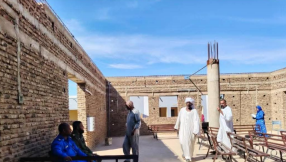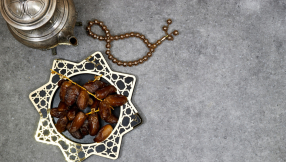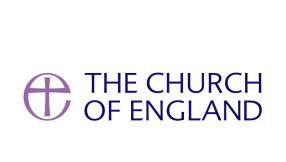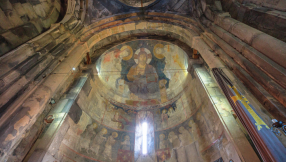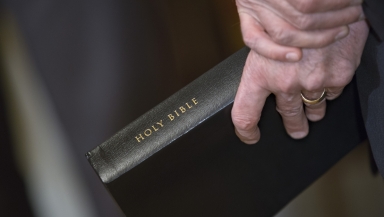
Sometimes the best evangelism is just the Bible and a well lived Christian life day-to-day. That's one of the conclusions from two of the researchers from this week's 'Religion in the Caucasus' conference, hosted by the European Azerbaijani Society in London.
With the region sitting snugly between Iran, Turkey, Russia and the Caspian Sea, it is little wonder that the stories from Christians there are ones of living in co-existence with neighbours of other faiths.
The result though is thriving churches, rather than the dilution so often feared in multicultural contexts.
Dr Marcin Rzepka of the Pontifical University of John Paul II in Krakow, told some of the stories of the 19<sup>th century Protestant missionaries that came to the Caucasus from Scotland. Although they were far from the first Christians in the region, they did provide a unique and important service for the local church communities.
"The translation of the Bible was one of the main objects of missionary activity," Dr Rzepka explained. "We may assume that the concept of Bible translation with the presumption that 'the Bible is the best missionary on its own' is a characteristic feature of the Protestant missionary movement."
This translation work was important because although there had been Christians in the Caucasus since the time of Saint Bartholomew, "the Caucasian people ... were not in possession of any Christian text in their own language."
This breakthrough allowed Christians in the region to make faith a personal act, rather than a declaration of political allegiance.
This is because previously, conversion from one faith to another would have been understood as a kind of "de-ethnicisation" and meant a loss of connection with one's family and cultural traditions.
"The existence of a Bible translation into one's language ... stopped that process," Dr Rzepka explained.
The results of this speak for themselves. Although few became Protestant, Dr Rzepka shared the statistics for the rise of Christianity across the region, specifically in the Orthodox churches, from 31,669 in 1848 to 53,995 in 1859.
Dr Natia Jalabadze, of Tiblisi State University, shared a paper on interfaith communication and co-operation, and reported a trend towards new conversions among people who had recently migrated, especially the younger generations. It is a trend that was first noticed among migrants in the south-western Georgian town of Tsalka.
Researching the possible causes, Dr Jalabadze interviewed a local priest on the subject who said about those who newly become Christians: "Their behaviour becomes an example to others."
Giving an example of a Muslim coming to Christ, the priest said "Once, an Azerbaijani woman adopted Christianity. She worked with me, and she expressed a willingness to be baptised.
"Generally, everything results from personal relationships," he said.
Dr Jalabadze then went on to show how this impacted other communities more widely. One Muslim resident of an Azerbaijani village said: "Here in our village there are churches. Here on the hill, in the forest there is St Georges Church. They say it is Armenian. Armenians go there and we Azerbaijanis also go there... so what if we are Muslims? God is one. Christians and Muslims go there together.
"After we happen to live next to Christians, we no longer follow our religious rules strictly."
The overriding message of the conference was one of great optimism about the possibilities of prosperous co-existence between religions, both historically and in the contemporary world.
Director of the European Azerbaijani Society, Lionel Zetter, said: "In all my travels, I have never encountered a country like Azerbaijan, where the world's great faiths – Judaism, Christianity and Islam – sit so comfortably together."
Speaking about how such things come about, the Very Reverend Dr David Ison, Dean of St Paul's Cathedral, described the importance of strong identities in a multi-cultural world.
"If you have a strong identity, you can reach out to others and enter into discussion with them, without being threatened," he said.
"Only those of strong faith can identify the failings and problems in their communities ... Religions give us the tools to be self-critical."
Speaking about religion as a source of identity, Dr Ison said: "One of the most important things that religion helps us to do is to enable people to grow what is a healthy and positive identity, in which people of other faiths are seen, not as a problem, but as an opportunity for greater riches.
"One of the roles of the Church of England as a national Church is to create an environment where other faiths feel welcome and their members know what it is to be a part of British society."
Recalling his time as the Dean of Bradford, he said: "In Bradford we would hang up lights of various kinds from the street lamps. In October it was 'Happy Diwali', in November it was 'Happy Eid' and in December it was 'Happy Christmas'."
This "multi-confessional coexistence", as it was often called by the conference speakers, could be found in a variety of forms.
Dr Goshgar Koshgarly, of the Azerbaijani National Academy of Sciences, pointed to the huge variety of burial forms in first century Azerbaijan as an example of this.
From burying the dead in crouched positions in stone boxes, to laying them on their side under piles of stones, the existence of so many forms from the same period suggests a wide variety of religious groups were living in peace and harmony alongside each other, as meticulous funeral ceremonies would be less of a priority in a conflict-ridden society.
"It was perceived as a natural condition of the region that different ethnic groups accepted the individual elements of ideological attitudes of both their neighbours, the aborigines, and alien migrants as well," Dr Koshgarly explained.
The preservation of the different religions alongside one another also sheds light on the degree of tolerance expressed even in the most ancient parts of the region.
While Islam's early contact with Christianity often resulted in violent exchanges and dictatorial control, the Caucasus paints an alternative picture of hope.
"There was no persecution of other religions by Muslims in the Caucasus," said Dr Leyla Melikova, of the Azerbaijani National Academy of sciences, presenting her paper on Islam in Azerbaijan.
She argues that Christians were allowed to retain their identity and were never compelled to become Muslims or to in any way alter their culture.
"Christians still dominate across Armenia and Georgia to this day," said Dr Melikova. "Their way of life was preserved under Islamic rule."
"There has never been a religious confrontation between Christian Georgians and Muslim Azerbaijanis," added Dr Jalabadze.
Unlike other situations in Islamic conquest history, Christians were permitted to maintain their churches and other religious sites such as monasteries, as well as markets.
"Even the oldest, most ancient churches of the Armenian and Orthodox Christian communities were preserved under Islamic rule" said Dr Melikova.
Examples of these can be seen today across the Caucasus, such as Etchmiadzin Cathedral which was finished between 301 and 303AD, three centuries before the birth of Islam.
The Armenian Church to Saint Hripsimé Church also still stands in good condition today despite having been built in 601AD.
This preservation of Christianity is also seen in surviving texts. For some of the language groups that have now disappeared out of use, the Bibles translated into these tongues have survived.
Dr Bernard Outtier gave as an example of this fragments of Christian liturgy and a complete copy of John's Gospel discovered in 2008 and dated to between the 7th and 10th century.
Until relatively recently, scholars had no real idea of what the language of the Albanians in the first millennium after the life of Jesus had looked or sounded like.
Their language was thought to be extinct, yet the uncovered Gospel is a rare document that survived the passage of time. Dr Outtier said this suggested that amid the huge diversity of the Caucasus, Christianity must have been massively important. Not only that, great effort was made to keep the text in its original form.
The texts coming from the Greek liturgy of Jerusalem, rather than the Armenian or Georgian lectionary, is also telling, as he argues that to maintain documents from several centuries before, written in a country so far away, is a sign the people took the doctrines and teachings of Christianity very seriously. This at a time when where they lived was filled with the noises of many different cultures, ethnicities and religions with whom they lived harmoniously.
This peaceful co-existence continues to this day. Dr Jalabadze said: "Rarely in the world today could one find a space of just less than two square kilometres, that houses Orthodox Georgian, Armenian Apostolic, Roman Catholic, and Russian churches, all alongside mosques where Sunnis and Shiites pray, and synagogues where Georgian Jews and Askenazis lead joint services."
There are still some problems, however. Conversion between Muslims and Christians can be greeted with hostility by some members of the community.
Quoting the local priest again, Dr Jalabadze reported: "We have a boy here who was baptised secretly."
Christians in certain house church groups have also been arrested in recent times. These infringements have resulted in Open Doors ranking Azerbaijan as the 38th worst persecutor of Christians in the world.
The religious rights group has reported raids and attacks on house churches in the country.
However, Mr Zetter believes it is less Christianity that the Azerbaijani authorities take objection to and more how certain churches failures to engage with the country's bureaucratic structure.
"It is a post-Soviet country," Mr Zetter said. "They do love their bureaucracy. Of course it is regrettable, but it is an evolutionary process. They really have no problem with religion."










